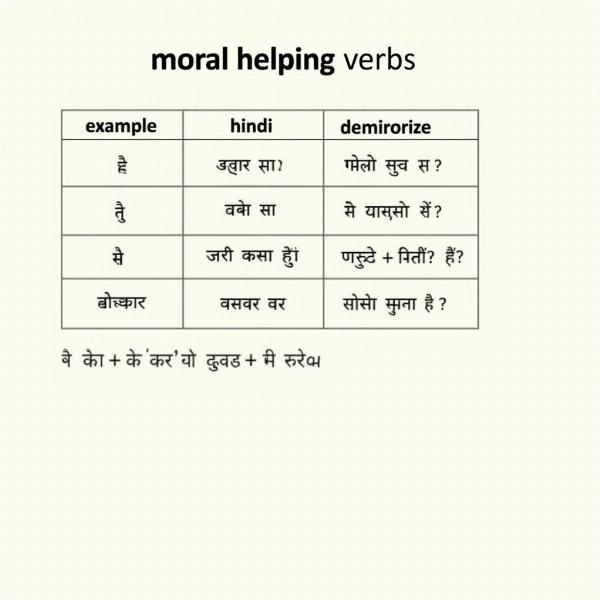Helping verbs, also known as auxiliary verbs, are essential components of English grammar. They add functional or grammatical meaning to the main verb in a sentence, expressing tense, aspect, modality, voice, emphasis, etc. Understanding helping verbs is crucial for constructing grammatically correct and nuanced sentences. This article will provide a comprehensive list of helping verbs with their Hindi meanings, addressing the common query for a “helping verbs list with Hindi meaning pdf.”
Primary Helping Verbs: Be, Do, Have
These verbs can function both as helping verbs and main verbs. Their usage depends on the context of the sentence.
- Be (होना – Hona): Forms include is, am, are, was, were, be, being, been. It helps form continuous tenses and passive voice.
- Example: She is reading a book (वह किताब पढ़ रही है – Vah kitaab padh rahi hai).
- Do (करना – Karna): Forms include do, does, did. Used for forming questions, negations, and adding emphasis.
- Example: Do you like coffee? (क्या आपको कॉफ़ी पसंद है? – Kya aapko coffee pasand hai?)
- Have (रखना/होना – Rakhna/Hona): Forms include have, has, had. Used for forming perfect tenses.
- Example: They have finished their work (वे अपना काम पूरा कर चुके हैं – Ve apna kaam pura kar chuke hain).
Modal Helping Verbs
Modal verbs always accompany a main verb and express possibility, ability, permission, obligation, etc.
- Can (सकना – Sakna): Expresses ability or possibility.
- Example: I can speak Hindi (मैं हिंदी बोल सकता हूँ – Main Hindi bol sakta hun).
- Could (सकता था – Sakta tha): Past tense of “can,” expressing past ability or polite requests.
- Example: Could you please pass the salt? (क्या आप कृपया नमक दे सकते हैं? – Kya aap kripya namak de sakte hain?)
- May (हो सकता है – Ho sakta hai): Expresses possibility or permission.
- Example: It may rain today (आज बारिश हो सकती है – Aaj barish ho sakti hai).
- Might (शायद – Shayad): Expresses a lower possibility than “may.”
- Example: I might go to the party (मैं पार्टी में जा सकता हूँ – Main party mein ja sakta hun).
- Must (चाहिए – Chahie): Expresses obligation or necessity.
- Example: You must follow the rules (आपको नियमों का पालन करना चाहिए – Aapko niyamon ka paalan karna chahie).
- Shall (करूँगा/करूँगी – Karunga/Karungi): Used to form future tense, primarily in formal contexts or questions.
- Example: Shall we begin? (क्या हम शुरू करें? – Kya hum shuru karen?)
- Should (चाहिए – Chahie): Expresses advice or recommendation.
- Example: You should eat healthy food (आपको स्वस्थ भोजन खाना चाहिए – Aapko swasth bhojan khana chahie).
- Will (करूँगा/करूँगी – Karunga/Karungi): Used to form future tense and express willingness.
- Example: I will go to the market tomorrow (मैं कल बाजार जाऊँगा – Main kal bazaar jaunga).
- Would (करता/करती – Karta/Karti): Past tense of “will” expressing past habits or polite requests.
- Example: Would you like some tea? (क्या आप चाय पसंद करेंगे? – Kya aap chai pasand karenge?)
 Modal Helping Verbs Examples
Modal Helping Verbs Examples
Understanding Helping Verb Usage
Using helping verbs correctly is key to fluent English. Pay attention to the tense and context of your sentence to choose the appropriate helping verb.
- For Negative Sentences: Helping verbs are essential for forming negative sentences.
- Example: I do not like spicy food (मुझे मसालेदार खाना पसंद नहीं है – Mujhe masaledar khana pasand nahi hai).
- For Questions: Inversion of the subject and helping verb forms a question.
- Example: Have you seen the movie? (क्या आपने फिल्म देखी है? – Kya aapne film dekhi hai?)
Conclusion
Mastering helping verbs is crucial for effective communication in English. This article provided a detailed list of helping verbs with their Hindi meanings, aiming to assist those searching for a “helping verbs list with hindi meaning pdf.” By understanding the function and usage of each helping verb, you can significantly improve your English grammar and fluency.
FAQs
- What is the difference between a helping verb and a main verb? Helping verbs support the main verb, while the main verb expresses the action or state of being.
- Can a sentence have more than one helping verb? Yes, a sentence can have more than one helping verb. For example, “She will be going to the party.”
- Why are helping verbs important? They are crucial for forming different tenses, questions, and negative sentences.
- How can I learn more about helping verbs? Practice and consistent exposure to English grammar resources can help improve your understanding.
- Where can I find more examples of helping verbs in use? Reading English books, articles, and watching English movies can provide practical examples.
- Is there a difference in the use of helping verbs in British and American English? Some minor differences exist, particularly in the use of “shall” and “will.”
- Are there any online resources that can help me practice using helping verbs? Yes, numerous online quizzes and exercises are available to help you practice.
Meaning-Hindi.in offers professional translation services in Hindi and other languages, specializing in business, legal, technical, website localization, educational, and specialized translations. Our expertise covers a wide range of fields, ensuring accurate and culturally sensitive translations. Need help with your translation project? Contact us at [email protected] or call us at +91 11-4502-7584. Meaning-Hindi.in is your trusted partner for all your translation needs.